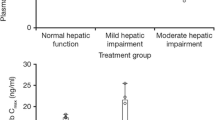Summary
Clinical trials of the epidermal growth factor receptor (EGFR) tyrosine kinase inhibitors (TKIs) gefitinib and erlotinib have shown that some patients receiving these agents develop severe hepatotoxicity that necessitates treatment cessation. Both drugs undergo extensive hepatic metabolism mediated predominantly by cytochrome P450 family enzymes. Afatinib is a second-generation, irreversible EGFR-TKI that competes with ATP for binding to EGFR and the related proteins HER2 and HER4 and whose major circulating metabolites are covalent drug-protein adducts. We here describe a patient with EGFR mutation–positive lung adenocarcinoma who developed severe hepatotoxicity during treatment first with gefitinib and then with erlotinib, but who was subsequently able to continue treatment with afatinib for at least 44 weeks with no evidence of hepatotoxicity or disease progression. As far as we are aware, this is the first report of successful treatment with afatinib after the development of high-grade hepatotoxicity during both gefitinib and erlotinib therapy.

Similar content being viewed by others
References
Takeda M, Okamoto I, Makimura C, et al. (2010) Successful treatment with erlotinib after gefitinib-induced severe interstitial lung disease. J Thorac Oncol 5:1103–1104
Kijima T, Shimizu T, Nonen S, et al. (2011) Safe and successful treatment with erlotinib after gefitinib-induced hepatotoxicity: difference in metabolism as a possible mechanism. J Clin Oncol 29:e588–e590
Solca F, Dahl G, Zoephel A, et al. (2012) Target binding properties and cellular activity of afatinib (BIBW 2992), an irreversible ErbB family blocker. J Pharmacol Exp Ther 343:342–350
Mitsudomi T, Morita S, Yatabe Y, et al. (2010) Gefitinib versus cisplatin plus docetaxel in patients with non-small-cell lung cancer harbouring mutations of the epidermal growth factor receptor (WJTOG3405): an open label, randomised phase 3 trial. Lancet Oncol 11:121–128
Maemondo M, Inoue A, Kobayashi K, et al. (2010) Gefitinib or chemotherapy for non-small-cell lung cancer with mutated EGFR. N Engl J Med 362:2380–2388
Goto K, Nishio M, Yamamoto N, et al. (2013) A prospective, phase II, open-label study (JO22903) of first-line erlotinib in Japanese patients with epidermal growth factor receptor (EGFR) mutation-positive advanced non-small-cell lung cancer (NSCLC. Lung Cancer 82:109–114
Inoue A, Kobayashi K, Usui K, et al. (2009) First-line gefitinib for patients with advanced non-small-cell lung cancer harboring epidermal growth factor receptor mutations without indication for chemotherapy. J Clin Oncol 27:1394–1400
Zhou C, YL W, Chen G, et al. (2011) Erlotinib versus chemotherapy as first-line treatment for patients with advanced EGFR mutation-positive non-small-cell lung cancer (OPTIMAL, CTONG-0802): a multicentre, open-label, randomised, phase 3 study. Lancet Oncol 12:735–742
Sequist LV, Yang JC, Yamamoto N, et al. (2013) Phase III study of afatinib or cisplatin plus pemetrexed in patients with metastatic lung adenocarcinoma with EGFR mutations. J Clin Oncol 31:3327–3334
Wu YL, Zhou C, Hu CP, et al. (2014) Afatinib versus cisplatin plus gemcitabine for first-line treatment of Asian patients with advanced non-small-cell lung cancer harbouring EGFR mutations (LUX-Lung 6): an open-label, randomised phase 3 trial. Lancet Oncol 15:213–222
Takeda M, Okamoto I, Nakagawa K (2015) Pooled safety analysis of EGFR-TKI treatment for EGFR mutation-positive non-small cell lung cancer. Lung Cancer 88:74–79
Author information
Authors and Affiliations
Corresponding author
Ethics declarations
Conflict of interest
HH has received lecture fees from AstraZeneca K.K. and Chugai Pharmaceutical Co. Ltd. as well as advisory fees from AstraZeneca K.K. and Boehringer Ingelheim Japan Inc. KN has received lecture fees and advisory fees from Chugai Pharmaceutical Co. Ltd., AstraZeneca K.K., and Boehringer Ingelheim Japan Inc.
Funding
There is no funding about this case report.
Ethical approval
All procedures performed in studies involving human participants were in accordance with the ethical standards of the institutional and/or national research committee and with the 1964 Helsinki declaration and its later amendments or comparable ethical standards.
Informed consent
Informed consent was obtained from the subject of this study.
Rights and permissions
About this article
Cite this article
Ueda, H., Hayashi, H., Kudo, K. et al. Successful treatment with afatinib after gefitinib- and erlotinib-induced hepatotoxicity. Invest New Drugs 34, 797–799 (2016). https://doi.org/10.1007/s10637-016-0384-1
Received:
Accepted:
Published:
Issue Date:
DOI: https://doi.org/10.1007/s10637-016-0384-1




